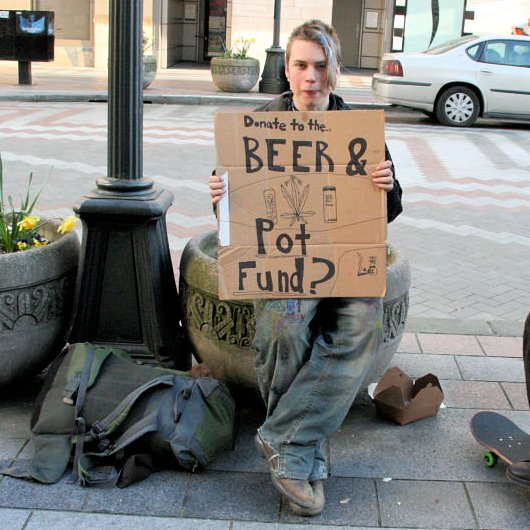Quote Originally Posted by aCultureWarrior
I'd covered pretty much everything in your first post on page 1 in the other thread, but will so do again one plank at a time.
As I'd shown in the Wallbuilders link, http://www.wallbuilders.com/LIBissue...les.asp?id=106
you Libertarians are taking John Locke's words out of context, so please don't continue to make one of our highly respected Founding Fathers part of your godless cult.
The definition of liberty has radically changed for the worse in 200+ years. In John Locke's time liberty meant freedom from sin, you Libertarians have hijacked the word defining it as a freedom to sin.
The Founding Fathers abhorred the things that you Libertarians find acceptable (when I say acceptable, I mean giving it the status of being some kind or "right", thus allowing it to take place without threat of punishment).
The Founders on Homosexuality
http://www.apologeticspress.org/apcontent.aspx?category=7&article=1126
Quote: Originally posted by aCultureWarrior
Regarding self ownership/free will: Man is given free will by God to make decisions. Since man is given free will, he "owns" the choices he makes. Nowhere in Holy Scripture does God say that man is to make bad decisions. It's been established that the righteous role of government is 'to do good as seen through the Eyes of God'. Make your case why things such as homosexuality, abortion, incest, pornography, prostitution and suicide should remain or be legal (based on the Libertarian "self ownership" principle), but make it from a secular humanist perspective, because God abhors such things as does a righteous government that rules with His morals in mind.
Ok, we'll play by your rules, as it will save time in making my case.
You're partially correct. No other person can claim ownership to another person because that amounts to slavery. A righteous government does and justifiably can enslave someone that is committing acts that are harmful to not only others and society as a whole, but to themselves (they're called "correctional facilities").
Now I'll start getting specific here, as much as you Libertarians hate dealing with reality, it's time to do so.
Tell me that a man standing on the railing of a bridge has every "right" in the world to kill himself, and that it's wrong for people to physically pull that man from the bridge and put him in a place (a psychiatric hospital) where he'll get much needed help.
After you tell me that it's wrong, I'll follow up with:
"What if it were your son, brother or father, would your attitude change then?"
You've made your own standard for evil (i.e. immoral behavior). It's your and your fellow Libertarians' opinions that self ownership and property rights gives a person the supposed "right" to commit immoral acts. Again, you'll find that nowhere in the Bible nor in our nation's founding documents.
As they are now. But in your Libertarian world, things like homosexuality, incest, pornography, prostitution, suicide and all recreational drug use would be legal. As we've seen for the past several decades since the decriminalization of abortion, homosexuality and pornography, it's a recipe for anarchy. Regarding murder and assault:
You do realize that dueling/gang warfare is "consensual murder" don't you? Both parties go into the ordeal knowing that one party will die. You do realize that BDSM is "consensual assault" don't you? Surely you wouldn't imprison "consenting adults" just because they're beating up one another?
Sexuality immorality has always been punished by the civil magistrate because of the seriousness of the matter. We've seen what has happened to individuals and society in general since these both immoral (adultery, cohabitation, abortion) and perverse (homosexuality, pornography) behaviors have been decriminalized: Peoples' lives are lost, destroyed and societies valuable institutions (marriage, the family, the Church, Education, youth mentor groups) are redefined to embrace immoral behaviors, not godly ones.
I'd covered pretty much everything in your first post on page 1 in the other thread, but will so do again one plank at a time.
As I'd shown in the Wallbuilders link, http://www.wallbuilders.com/LIBissue...les.asp?id=106
you Libertarians are taking John Locke's words out of context, so please don't continue to make one of our highly respected Founding Fathers part of your godless cult.
You are still evading. The point I am making isn't that John Locke is a libertarian per se, as I already mentioned.
The definition of liberty has radically changed for the worse in 200+ years. In John Locke's time liberty meant freedom from sin, you Libertarians have hijacked the word defining it as a freedom to sin.
The Founding Fathers abhorred the things that you Libertarians find acceptable (when I say acceptable, I mean giving it the status of being some kind or "right", thus allowing it to take place without threat of punishment).
The Founders on Homosexuality
http://www.apologeticspress.org/apcontent.aspx?category=7&article=1126
Quote: Originally posted by aCultureWarrior
Regarding self ownership/free will: Man is given free will by God to make decisions. Since man is given free will, he "owns" the choices he makes. Nowhere in Holy Scripture does God say that man is to make bad decisions. It's been established that the righteous role of government is 'to do good as seen through the Eyes of God'. Make your case why things such as homosexuality, abortion, incest, pornography, prostitution and suicide should remain or be legal (based on the Libertarian "self ownership" principle), but make it from a secular humanist perspective, because God abhors such things as does a righteous government that rules with His morals in mind.
No and no again. Free will is not self ownership. This is not difficult aCultureWarrior. Ownership has to do with who is allowed ultimate control of a particular object or, in this case, their own person.
Ok, we'll play by your rules, as it will save time in making my case.
Just think of owning a car. You can do what you like to your own car. It isn't illegal if you decide to take a sledge hammer to it. You can change the oil as much as you like or not. You can leave it in your garage or outside. Why? Because you OWN it. Think of what OWNING something means. OWNERSHIP means sovereign control over an object or, in the case of slavery, a person. We are saying that no other person or institution can claim ownership over another person because that amounts to slavery - period.
You're partially correct. No other person can claim ownership to another person because that amounts to slavery. A righteous government does and justifiably can enslave someone that is committing acts that are harmful to not only others and society as a whole, but to themselves (they're called "correctional facilities").
Now I'll start getting specific here, as much as you Libertarians hate dealing with reality, it's time to do so.
Tell me that a man standing on the railing of a bridge has every "right" in the world to kill himself, and that it's wrong for people to physically pull that man from the bridge and put him in a place (a psychiatric hospital) where he'll get much needed help.
After you tell me that it's wrong, I'll follow up with:
"What if it were your son, brother or father, would your attitude change then?"
Your definition of the role of government is so broad ('to do good as seen through the Eyes of God') that anyone can make it mean whatever they want, including Locke. The government should IN FACT punish people for evil, namely, the evil of denying another the right to self ownership and ownership of their own property.
You've made your own standard for evil (i.e. immoral behavior). It's your and your fellow Libertarians' opinions that self ownership and property rights gives a person the supposed "right" to commit immoral acts. Again, you'll find that nowhere in the Bible nor in our nation's founding documents.
So murder, rape, stealing, fraud, vandalism, polluting, assault, trespassing, etc. would all be punishable.
As they are now. But in your Libertarian world, things like homosexuality, incest, pornography, prostitution, suicide and all recreational drug use would be legal. As we've seen for the past several decades since the decriminalization of abortion, homosexuality and pornography, it's a recipe for anarchy. Regarding murder and assault:
You do realize that dueling/gang warfare is "consensual murder" don't you? Both parties go into the ordeal knowing that one party will die. You do realize that BDSM is "consensual assault" don't you? Surely you wouldn't imprison "consenting adults" just because they're beating up one another?
Your verses say nothing about which sins should be punishable by law - and I think we can both agree that every sin should NOT be punishable by law - and so really are not proof texts against what I and other libertarians are saying. These verses need application and that is where we differ, not on what the text itself is saying.
Sexuality immorality has always been punished by the civil magistrate because of the seriousness of the matter. We've seen what has happened to individuals and society in general since these both immoral (adultery, cohabitation, abortion) and perverse (homosexuality, pornography) behaviors have been decriminalized: Peoples' lives are lost, destroyed and societies valuable institutions (marriage, the family, the Church, Education, youth mentor groups) are redefined to embrace immoral behaviors, not godly ones.


